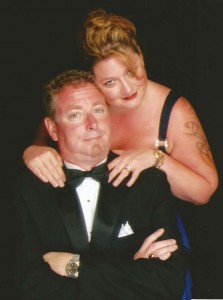Overcoming Impostor Syndrome – A Work in Progress!
This is not a subject I am blogging about lightly or without a lot of thought and effort. (I think it’s been in my drafts folder for almost 6 months now) However, it is a topic that is important to me, so I wanted to start the discussion.
Until 2009 I had never even heard of Impostor Syndrome. While at the inaugural Community Leadership Summit (CLS) I made some self-deprecating joke and my friend Emma Jane Hogbin asked me if I had ever heard of the term. I told her no, and she went on to explain it to me. Later the same day, Kirrily “Skud” Robert and I talked about it some more.
I attended OSCON 2009 and throughout the week and on the flight home I thought more about this Impostor Syndrome I had just learned about; however, the reality was I just learned there was a term for something that I in fact understood more about than I was willing to let on at the time. I looked up more about it and decided if I was ever going to be me, I mean authentically me I needed to do something about this self-doubt, low self-esteem and this feeling like I wasn’t good enough, in other words I needed to get over feeling like I was an Impostor because the fact was, I wasn’t then, I’m not today and I certainly don’t plan on being one tomorrow.
According to the Geek Feminism (GF) wiki, “Women experiencing impostor syndrome may be less willing to put themselves forward, feeling that they are not qualified…” Examples include:
- not applying for jobs, promotions, and other employment opportunities
- not submitting papers to conferences or journals
- disclaiming or understating their experience/skill when speaking or writing
- nervousness about talking to others in their field, especially if those others are perceived as highly skilled/experienced
- feeling like a fraud
- worrying that someone will find out their lack of qualifications and fire them
- having higher stress
- over-preparing for tasks
- attributing successes to chance or luck
The GF wiki also list ways to combat this syndrome which are broken down into the following areas: For those who suffer from Impostor Syndrome, For Friends and Colleagues, For Friends and Colleagues 2, For Hiring Managers, Conference Chairs, etc, but the wealth of information doesn’t stop there; check out the further reading section for more information.
The sad thing for me was that there were so many ‘well intended’ (and I use the term loosely here) people who didn’t help. They didn’t help me and they certainly didn’t help others (not that I think everyone was put on this earth to help me, mind you, but “Primum non nocere” or “first, do no harm” should apply to everyone not just doctors–words harm too.) They told me things like, “Well the only reason you are successful in Ubuntu is because of who your husband is.” Or other statements, “You should stick to the non-technical stuff like documentation, you aren’t technical enough.” Ha, ever tried to use docbooks, edit a wiki, what about a man page without some technical knowledge of the system or application you are using. Oh the list goes on and if I think about it too long I really get pissed off. Especially when I think about how many women don’t help other women, instead they let professional or personal jealousy get in the way and they sabotage each other or worse themselves.
So, what did I do about it? I called a therapist, yep you read that right. Not ashamed to say it or admit, I’ve spent the last 2 years dealing with it and I can honestly say I am better for having done it. What I’ve also found out in the last 2 years as I open up about combating this myself is the number of not only women, but men in FOSS who have gone or are going through something similar.
One of the suggestions for combating Impostor Syndrome is to blog about your experiences, so I guess today is my start. While I am confident in my abilities and my skills, there was a time, not to long ago I doubted them, and I questioned if I was “good enough”. I would hate for one person I know, to be going through something similar and feel like I wouldn’t understand. I do understand and I know it’s an obstacle that can be overcome.
I turned to Dr. Terry Ledford, who recently published a book called ‘Parables for a Wounded Heart: Overcoming the Wounds to Your Self-Esteem and Transforming Your Perception of You”
The description description of the book asks, “Do you tend to be self-critical or negative about yourself? Did you experience painful childhood events that wounded your self-esteem? When children experience criticism, rejection, trauma or abuse, they may perceive that they are to blame. Such painful events can alter their identity, not who they are, but who they believe that they are. A wound of the heart is formed. A wound of the heart is a hurt or a series of hurts that affects your core being, sense of self or self-concept. “Parables for a Wounded Heart” is a breakthrough guide to help you heal your heart wounds by combining the proven principles of Cognitive Therapy with the emotional power of therapeutic stories. This program will touch your heart and bring new insights allowing a deep and lasting healing for your self-esteem. Dr. Ledford guides you through this process with great insight and compassion allowing you to see your past negative experiences and yourself in a very different way.”
Many of the stories in this book and the subsequent exercises you can do, I had the opportunity to discuss and complete with Dr. Ledford in our sessions or in his Self-Esteem Workshops. I am sure there are many excellent therapists and self-help resources out there, I’m just sharing with you the resources I found helpful. It pains me to think that anyone (man or woman) would have to deal with self-doubt, low self-esteem, or Impostor Syndrome a day longer than they have too.
One of the other interesting things that happened during the last couple of years was realizing that the philosophies and tools we use in Open Source Projects combine with the lessons I was learning from Dr. Ledford really re-enforced and helped me to be a better, more productive, successful and happier me. I am so glad Emma, Skud, Rikki Endsley and other women who were at that first CLS pulled me aside to talk. It has and continues to be a lesson I build on daily. A big “Thank you” also goes to the Ubuntu Women Project especially members Melissa Draper, Elizabeth Krumbach, Penelope Stowe, and Leigh Honeywell who are all amazing mentors for women who want to get involved in technology. Thanks, y’all!
It also helps that I work with engineers on a daily basis at Linaro, who challenge me to become better and never assume I can’t do something; instead they seem to assume just the opposite, they assume I can do anything I put my mind to and I’ll ask for help when I need to. That is empowering!
Do you have an inspiring story about overcoming Impostor Syndrome? In 2013 I’d like to have a monthly hangout and invite others to join in the discussion, I’m not the expert and I can only share my experiences, but I’d like to invite others to share theirs as well as experts in the field to facilitate some of these hangouts. Thoughts? Shoot me an email and let’s get this ball rolling.





Thank you for this post. The FOSS community should be a more welcoming, helpful and encouraging place for any of us to participate, contribute and in turn welcome others.
Thank you for posting this.
I remember when I heard about imposter syndrome the first time. What an eye opener. Just realising that it is a common thing is a huge step in dealing with it. Thanks for reminding me of it.